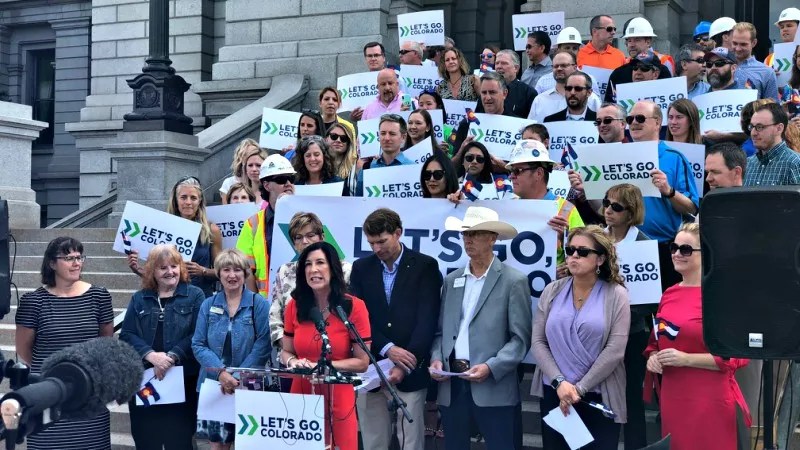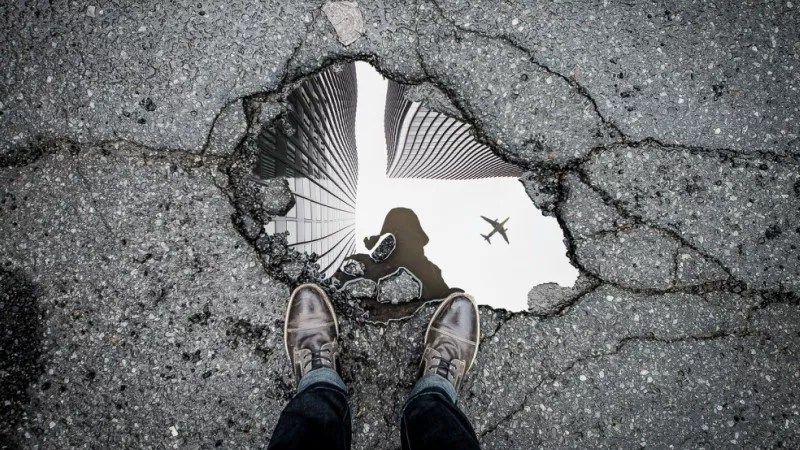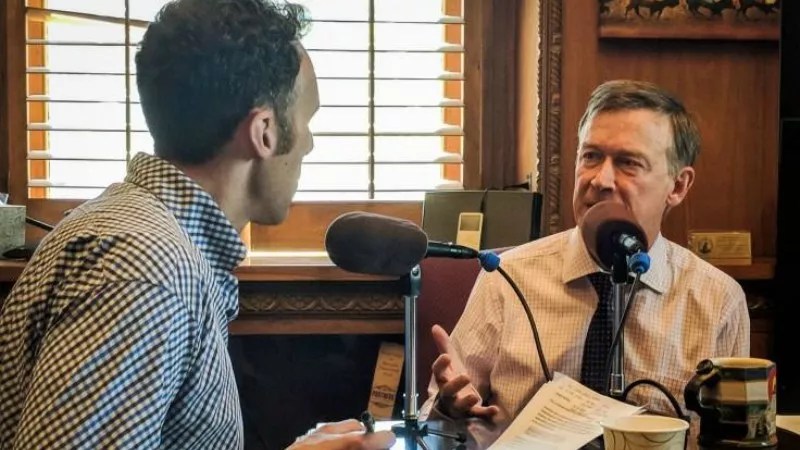

Audio By Carbonatix
Editor’s note: Transportation issues are top of mind for Coloradans, who’ll have two initiatives designed to improve the situation from which to choose when they vote in November: Proposition 109, popularly known as Fix Our Damn Roads, and Proposition 110, aka Let’s Go Colorado. Read about the former in our post “The Case for Proposition 109, Fix Our Damn Roads Transportation Measure.” Here’s more about the latter.
According to Sean Duffy, spokesman for Let’s Go Colorado, one of the most important aspects of the sales-tax increase designed to fund Proposition 110 is its limitations.
“The money is walled off, so it can’t be used for anything but transportation projects,” he says. “Because the worst thing you can do is put a pot of money near politicians and say, ‘Don’t touch.'”
Duffy portrays Proposition 110 as “a very straightforward request of Colorado taxpayers.” But the ballot title and submission clause shared on the Colorado Secretary of State’s website is a bit of a thicket. It reads:
SHALL STATE TAXES BE INCREASED $766,700,000 ANNUALLY FOR A TWENTY-YEAR PERIOD, AND STATE DEBT SHALL BE INCREASED $6,000,000,000 WITH A MAXIMUM REPAYMENT COST OF $9,400,000,000, TO PAY FOR STATE AND LOCAL TRANSPORTATION PROJECTS, AND, IN CONNECTION THEREWITH, CHANGING THE COLORADO REVISED STATUTES TO: 1) INCREASE THE STATE SALES AND USE TAX RATE BY 0.62% BEGINNING JANUARY 1, 2019; REQUIRING 45% OF THE NEW REVENUE TO FUND STATE TRANSPORTATION SAFETY, MAINTENANCE, AND CONGESTION RELATED PROJECTS, 40% TO FUND MUNICIPAL AND COUNTY TRANSPORTATION PROJECTS, AND 15% TO FUND MULTIMODAL TRANSPORTATION PROJECTS, INCLUDING BIKE, PEDESTRIAN, AND TRANSIT INFRASTRUCTURE; 2) AUTHORIZE THE ISSUANCE OF ADDITIONAL TRANSPORTATION REVENUE ANTICIPATION NOTES TO FUND PRIORITY STATE TRANSPORTATION MAINTENANCE AND CONSTRUCTION PROJECTS, INCLUDING MULTIMODAL CAPITAL PROJECTS; AND 3) PROVIDE THAT ALL REVENUE RESULTING FROM THE TAX RATE INCREASE AND PROCEEDS FROM ISSUANCE OF REVENUE ANTICIPATION NOTES ARE VOTER-APPROVED REVENUE CHANGES EXEMPT FROM ANY STATE OR LOCAL REVENUE, SPENDING, OR OTHER LIMITATIONS IN LAW?
Here’s how Duffy describes the genesis of the proposal:

Lone Tree Mayor Jackie Millet speaks about Proposition 110 during a Let’s Go Colorado rally on the steps of the Colorado State Capitol.
“We all recognize that our transportation system, our roads, our bridges, are in need of significant attention, whether it’s repair or expansion,” he notes. “For example, we now invest half of what we did for motorists that we did 25 years ago, even though, obviously, the population has gone up very significantly since then, and lane miles in the state have basically flat-lined. It’s like trying to put a tennis ball through a garden hose.”
In the past, most road-improvement measures have been funded by a gas tax, Duffy points out – “but today, that’s a problem. We’ve seen an increase in the fuel efficiency of cars, and the rise of electric cars makes a gas tax a decreasingly efficient approach. We’d need a phenomenal tax increase to make it work: something like thirty or forty cents a gallon. And it’s only going to get worse.”
With that in mind, he continues, “a big coalition of business folks and elected folks [led by the Metro Denver Chamber of Commerce] said, ‘We’ve really got to find a dedicated, sustainable source of transportation funding.’ Just at the state level, there’s a $9 billion hole in project needs that the Colorado Department of Transportation has identified. And when you look at the state level, where we’ve got priorities like public safety and schools and higher education and prisons, we haven’t been able to come up with the dollars we need. So they’ve proposed a .62 percent tax increase, about six cents on a ten-dollar purchase, to go to transportation.”
The tax is expected to generate around $767 million in year one and likely more in succeeding years over the next two decades. Of that amount, Duffy says, “45 cents of each dollar would go to the state transportation fund, and 40 cents would be split between counties and municipalities for projects to be identified and accountable locally – and that’s important, because all of us usually start or finish our day on a local or county road. They need work, too, so local officials will be able to sit down and have a conversation about what needs to be done. And the other 15 percent is for multi-modal projects like transit stations and senior dial-a-ride to address senior mobility, which is a real problem in rural areas.”

Another photo from the Let’s Go Colorado Facebook page.
By bonding the revenue, the state is expected to generate around $6 billion. “That takes a big chunk out of the $9 billion identified by CDOT, plus it will fund a lot of other local projects,” Duffy allows.
Convincing Coloradans to jack up their own taxes is a tall order. But Duffy believes the scope of the problem should help overcome any reluctance.
“People will understand that without additional dollars, they’re not going to be able to repair the reasons they’re stuck in traffic,” he says. “Of course, they see it when they go into the mountains, but it’s much more widespread than that. It’s trying to get your kids to soccer practice on time, or just trying to get to work. You lose half an hour on I-25 on a good morning. My drive from Highlands Ranch to downtown Denver is an hour and ten minutes, and I-25 south in the evenings is a parking lot. Everybody has a story like that. It doesn’t matter where you are in Colorado. That’s why we’re trying to reach folks all over the state, whose needs have been neglected for too long and have to be addressed. This has social and economic and quality-of-life impact, and we’ve got to get serious about it.”
The Independence Institute’s Jon Caldara, the main man behind Proposition 109, known as Fix Our Damn Roads, maintains that no new fees are needed to address our transportation system given additional funds Colorado residents will already be spending because state legislators failed to adjust rates in tandem with tax cuts at the federal level. He also blasts Proposition 110 for not specifying the projects the revenues will fund; Fix Our Damn Roads lists 65 it would target.
In addressing these issues, Duffy acknowledges that “most business folks find new taxes to be an anathema. They’re not interested in proposing a tax increase when one isn’t warranted. But in searching for the secret pot of money that apparently some believe is nestled in a side office or janitor’s closet in the Capitol, they’ve discovered that it just doesn’t exist.”

Governor John Hickenlooper is among the Colorado officials who’ve endorsed Proposition 110.
He adds that some of the additional revenue from the federal tax cuts “apparently has already been bonded by the state. The tax cuts also could be repealed over the course of their ten-year lifetime. The amount that may come is based on estimates, not including any economic downturn that may hit the nation. The uncertainty here points again to the need for a guaranteed, reliable and sustainable funding stream to actually start and complete the projects that are needed at the state and local levels.”
In Duffy’s words, Proposition 110 “isn’t a think tank exercise – and I’m very familiar with those. I used to run a think tank in Pennsylvania that was the same flavor as Jon’s. So I know the difference between a solution and a theory. And with so many competing priorities in the budget, coming up with the kind of dollars that are needed in the first year is very, very difficult given the political realities. Certainly there are many who would say, ‘If we can do that, it would have been done.’ So the notion of just trusting politicians to figure it out when they haven’t done it before is a recipe for continuing the status quo. This is a problem that’s lingered for more than a decade. So we think it’s time to ask taxpayers to dedicate money to the transportation system.”
As for Caldara’s complaints about what he derisively refers to as “mystery projects,” Duff maintains that “it’s at odds with simple reality in two ways. We’ve got to deal with local transportation needs – and local officials will have to discuss with their local communities the specific projects they want to use their dollars on. They’ll have to do it publicly and transparently. Secondly, our proposal sets up a commission that will review and publish what the dollars are used for from the transportation tax. The notion that local officials will be able to go out and do outlandish and odd things is a way of deflecting the real needs at the local and county levels. Those local officials can tell you where the dollars need to go. So that’s a really specious argument.”
In the end, Duffy believes that “the issue before voters is: What is the route to provide the type of guaranteed improvements in the transportation system that they want? Is it the hopes and good wishes that the legislature might do something, which has proven to be a challenging journey for motorists over the past several years?”
His answers to these questions: “If you want to fix our transportation system, you need to provide the resources guaranteed to do it. The multi-layered bank shots required to maybe, possibly get some percentage of the money that’s needed are a pretty big risk they’re asking motorists to take. So while it theoretically might look alluring as an ideological white paper, you need a reliable source of dollars when it comes to building roads. And that’s what we argue our plan achieves.”